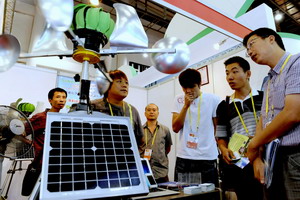Investment in Africa urged
Updated: 2011-09-09 07:48
By Li Jiabao and Bao Chang (China Daily)
|
|||||||||||
|
A worker does his job at a Chinese-invested bicycle factory in the Republic of Zimbabwe. In the first half of this year, China's non-financial foreign direct investment in Africa reached $800 million. [Photo/China Daily] |
Commerce Minister Chen cites food crisis as top development challenge
Xiamen, Fujian - China will encourage companies to invest in new fields in Africa including agriculture, manufacturing, finance and environmental protection industries, Chen Deming, the Chinese minister of commerce, said at a China-Africa investment and cooperation forum on Sept 8.
Chen said that Africa's development faces key problems including the food crisis and underdeveloped processing of agricultural products and natural resources. He said he encourages and supports "Chinese companies to invest in Africa, especially in of agriculture, manufacturing, finance and environmental protection."
"The development of Africa is key to the whole world's sustainable development. China is willing to build up a steady, fair and open environment for trade and investment with African countries and deepen cooperation in new fields and through new measures," Chen said at the symposium on China-Africa Investment Cooperation in Xiamen, Fujian province, during the 15th China International Fair for Investment and Trade (CIFIT).
By 2010, the trade volume between China and Africa had increased to $126.9 billion, 10 times that of 2000. In the first half of this year, China's non-financial foreign direct investment (FDI) in Africa reached $800 million, up 46.7 percent year-on-year, Chen said at the forum.
He listed the food crisis as the leading problem challenging the future development and said China's agricultural demonstration zones in Africa can serve as a model for Africa's modern agriculture.
"China has established agriculture demonstration zones in suitable areas with the application of modern seeds and modern technology. Agricultural products can be processed before being exported to increase the added value and increase employment," Chen said.
Walter M. Macharia, manager of the Kenya Investment Authority, welcomed Chinese investments, "especially in the fields of infrastructure, agricultural processing and irrigation".
"We welcome more and more Chinese companies, especially small businesses, to come to Kenya and engage in industries like coffee and tea processing," he said.
But Chen said the solution for Africa's agricultural development relies on peasants' initiative and zeal in agricultural production and the modernization of the irrigation system.
In addition to investment in agriculture, Chinese investments are also welcome in processing industries. Officials in some African countries have realized the urgency of developing the manufacturing industry.
"Zambia is rich in natural resources. But at present, we mostly need China's investment to process the raw materials. We would like to export flour rather than wheat," said Matayo Kaluba, chief planner of the Ministry of Trade and Industry in Zambia.
The development of raw materials will be the serve as the basis of Africa's long-term development, and Chen said "the primary processing of Africa raw materials and agriculture products should be remain in Africa to increase local employment and added value".
African countries welcome Chinese companies to establish factories.
"We have only three Chinese companies. We are looking for small and medium-sized Chinese companies to set up factories in our country and sell the products to European market," Noureddine Taktak, deputy director-general of the Agency of Promotion of Industry and Innovation of Tunisia. He said that Japanese and Korean companies have taken the lead in producing goods in Tunisia and selling them to European markets.
In the coming three years, the China Development Bank will lend up to $1 billion annually to small and medium-sized enterprises in Africa, said Liu Hao, deputy director of the international department of the bank. Many African countries welcome small and medium-sized Chinese companies because their countries and markets are small. But Chen sees a big market if regional economic integration were achieved, supported by a network of transportation, power and telecommunications.
China's economic and cooperation zones in Africa also provide a favorable environment for Chinese investment and promote the development of Africa.
China is building two economy zones in Zambia and Zambia will export $600 million value-added copper once the zones are completed, according to the Zambia Development Agency.
China's cooperation with Africa is expanding deeper into the financial sector.
"China will deepen its financial cooperation with Africa and provide $10 billion in preferential loans to African countries. In addition, China has given $50 billion to the International Monetary Fund and required that the money be used in the most underdeveloped countries."
Related Stories
Working together for future of Africa 2011-09-07 07:51
Africa calls and young entrepreneurs heed 2011-09-05 11:20
Top bank in Africa boosting business in yuan 2011-09-02 07:59
China to give $14m in aid to Africa 2011-08-05 07:57
- Time to focus on quality in finance, researcher says
- China's success can make US more prosperous
- ICBC signs MOU with UAE's industrial zone
- China's Lashou planning US IPO
- China's inflation eases to 6.2% in Aug
- Nike admits to false advertising
- Yuan will be fully convertible by 2015
- Shanghai to build world's biggest expo center














